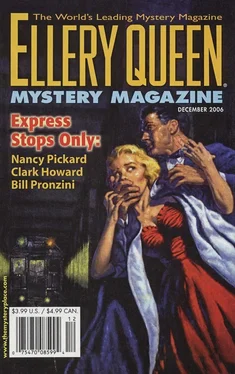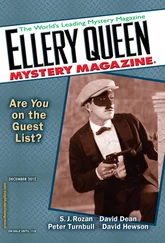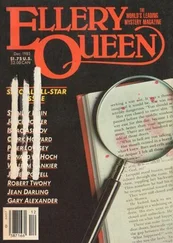Нэнси Пикард - Ellery Queen’s Mystery Magazine. Vol. 128, No. 6. Whole No. 784, December 2006
Здесь есть возможность читать онлайн «Нэнси Пикард - Ellery Queen’s Mystery Magazine. Vol. 128, No. 6. Whole No. 784, December 2006» весь текст электронной книги совершенно бесплатно (целиком полную версию без сокращений). В некоторых случаях можно слушать аудио, скачать через торрент в формате fb2 и присутствует краткое содержание. Город: New York, Год выпуска: 2006, ISBN: 2006, Издательство: Dell Magazines, Жанр: Детектив, на английском языке. Описание произведения, (предисловие) а так же отзывы посетителей доступны на портале библиотеки ЛибКат.
- Название:Ellery Queen’s Mystery Magazine. Vol. 128, No. 6. Whole No. 784, December 2006
- Автор:
- Издательство:Dell Magazines
- Жанр:
- Год:2006
- Город:New York
- ISBN:0013-6328
- Рейтинг книги:3 / 5. Голосов: 1
-
Избранное:Добавить в избранное
- Отзывы:
-
Ваша оценка:
- 60
- 1
- 2
- 3
- 4
- 5
Ellery Queen’s Mystery Magazine. Vol. 128, No. 6. Whole No. 784, December 2006: краткое содержание, описание и аннотация
Предлагаем к чтению аннотацию, описание, краткое содержание или предисловие (зависит от того, что написал сам автор книги «Ellery Queen’s Mystery Magazine. Vol. 128, No. 6. Whole No. 784, December 2006»). Если вы не нашли необходимую информацию о книге — напишите в комментариях, мы постараемся отыскать её.
Ellery Queen’s Mystery Magazine. Vol. 128, No. 6. Whole No. 784, December 2006 — читать онлайн бесплатно полную книгу (весь текст) целиком
Ниже представлен текст книги, разбитый по страницам. Система сохранения места последней прочитанной страницы, позволяет с удобством читать онлайн бесплатно книгу «Ellery Queen’s Mystery Magazine. Vol. 128, No. 6. Whole No. 784, December 2006», без необходимости каждый раз заново искать на чём Вы остановились. Поставьте закладку, и сможете в любой момент перейти на страницу, на которой закончили чтение.
Интервал:
Закладка:
The door, Quincannon had been told, had been installed as a deterrent to both rodents and human pilferage. Years before, a former brewery employee had returned at night and helped himself to a wagonload of sugar and barley, and Carreaux would brook no repeat of that business. The door was kept open during the day but locked at end of shift. Only a handful of men in supervisory positions had keys.
It should not have been closed now. Nor should it have been locked, which it was. Quincannon muttered an imprecation. Lansing must have done the locking; he had access to a key. But why? What could he be up to in the storerooms?
Quincannon listened at the door. No sounds came to him through the heavy wood. He bent at the waist to peer through the keyhole. All he could make out was an empty section of concrete floor, lighted but shadow-ridden. He straightened again, scowling, tugging at his beard. The loading-dock foreman, Jack Malloy, would have a key; find him, then, and waste no time in doing it.
Just as he turned away, the muffled bark of a pistol came from somewhere inside the storerooms.
Hell and damn! Quincannon swung back to the door, coming up hard against it, rattling it in its frame. Reflex made him tug futilely at the handle. There was no second report, but when he pressed an ear to the wood he heard several faint sounds.
Movement, but what sort he couldn’t tell. The silence that followed crackled with tension.
He pushed away again and ran back along the passage until he came on a workman just emerging from the cellars. He sent the man after the loading-dock foreman, then took himself back to the door. He tested the latch to make sure it was still locked, even though there was no way anyone could have come out and gotten past him.
Malloy arrived on the run, two other men trailing behind him. “What’s the trouble here?” he demanded.
“Someone fired a pistol behind that locked door,” Quincannon told him, “not five minutes ago.”
“A pistol?” Malloy said, astonished. “In the storerooms?”
“There’s no mistake.”
“But... Mr. Carreaux has strict orders against firearms on the premises...”
Quincannon made an impatient growling noise. “Button your lip, lad, and unlock the blasted door.”
The foreman was used to the voice of authority; quickly he produced his ring of keys. The door opened inward and Quincannon crowded through first. Two large, chilly rooms opened off the passage, one filled with sacks of barley, the other with boxes of yeast and fifty-pound sacks of malt, hops, and sugar stacked on end. Both enclosures were empty. The sacks and boxes were so tightly packed together that no one could have hidden behind or among them without being seen at a glance.
At the far end of the passage stood another closed door. “What’s beyond there?” he asked the foreman.
“Utility room. Well-pump and equipment storage.”
Quincannon tried the door. It refused his hand on the latch. “You have a key, Malloy?”
“The lock’s the same as on the storeroom door.”
“Then open it, man, open it.”
Malloy obeyed. The heavy, dank smells of mold and earth, and the acrid scent of gunpowder, tickled Quincannon’s nostrils as the door creaked inward. Only one electric bulb burned here. Gloom lay thick beyond the threshold, enfolding the shapes of well-pump, coiled hoses, hand trucks, and other equipment. Quincannon found a lucifer in his pocket, scraped it alight on the rough brick wall.
“Lord save us!” Malloy said.
Caleb Lansing lay sprawled on the dirt floor in front of the well-pump. Blood glistened blackly on his shirtfront. Beside one outflung hand was an old LeMat revolver, the type that used pinfire cartridges. Quincannon knelt to press fingers against the artery in Lansing’s neck. Not even the flicker of a pulse.
“What are you men doing here? What’s going on?”
The new voice belonged to Adam Corby, the pint-sized bookkeeper. He pushed his way forward, sucked in his breath audibly when he saw what lay at his feet.
“Mr. Lansing’s shot himself,” Malloy said.
“Shot himself? Here?”
“Crazy place for it, by all that’s holy.”
“Suicide,” Corby said in awed tones. “Lansing, of all people.”
Quincannon paid no attention to them. While they were gabbling, he finished his examination of the dead man and picked up the LeMat revolver, slipped it into his coat pocket.
Suicide?
Bah!
Murder, plain enough.
“Murder?” James Carreaux said in disbelief. “How can Lansing’s death possibly be murder? He died alone behind not one but two locked doors!”
“No, sir,” Quincannon said. “Not alone and not by his own hand.”
“I don’t understand how you can make such a claim.”
“He had no weapon when I braced him in the fermenting room — I would have noticed a pistol the size and shape of a LeMat. If he had been armed, he’d’ve drawn down on me instead of running like a scared rabbit.”
“He could have smuggled it in earlier and stashed it somewhere, couldn’t he?”
“Plan to take his own life when he had enough money to flee the city? And do it here in the brewery, in a blasted utility room? No, Mr. Carreaux, Caleb Lansing was murdered.” Quincannon paused to light his stubby briar. “Three facts prove it beyond a doubt.”
“What facts?”
“The location of the fatal wound, for one. Lansing was shot on the left side of the chest, just above the rib cage — a decidedly awkward angle for a man to hold a handgun for a self-inflicted wound. Most gunshot suicides choose the head as their target, for the obvious reason.”
“I’ll grant you that,” Carreaux said reluctantly.
“Second fact: There were no powder burns on Lansing’s shirt or vest. He was shot from a distance of at least eighteen inches, a physical impossibility if his were the finger on the trigger.”
“And the third fact?”
“His key to the two doors. It wasn’t on his person or anywhere in the utility room. He couldn’t have locked that door without it, now could he?”
The brewery owner sighed and swiveled his creaking chair for a long stare out the window behind his desk. Fog lay over China Basin and the bay beyond; tall ships’ masts were visible through its drift, like the fingers of skeletal apparitions. Quincannon, puffing furiously, created an equivalently thick tobacco fog in the office. The good rich aroma of navy plug helped mask some of the Golden Gate’s insidious pungency.
At length Carreaux swiveled back to face him. He was a large man of fifty-odd years, florid, with sideburns that resembled woolly tufts of cotton, and morose gray eyes. Not a happy gent, Quincannon judged, even at the best of times. He said obliquely, “Now you know why I have such an aversion to firearms.”
Quincannon made no comment.
“Well, then. You’ve convinced me — murder has been done in my house. Who the devil is responsible?”
“Lansing’s accomplice, of course.”
“Accomplice?”
“In the theft of Otto Ackermann’s formula for steam beer.”
“For the finest steam beer on the West Coast,” Carreaux amended grimly. “Golden Gate’s exclusive formula, until now. I don’t suppose there is any chance that Lansing, or this alleged accomplice of his, has yet to turn it over to West Star?”
“None, I’m afraid,” Quincannon said. “The charred note and the two thousand dollars in Lansing’s flat testify to a consummated deal.”
Carreaux sighed again. “I’ll try to get an injunction against West Star. But that may not stop them from implementing Ackermann’s formula, even with their duplicitous brewmaster in jail.”
“You still have the copy of the formula that Ackermann gave you?”
Читать дальшеИнтервал:
Закладка:
Похожие книги на «Ellery Queen’s Mystery Magazine. Vol. 128, No. 6. Whole No. 784, December 2006»
Представляем Вашему вниманию похожие книги на «Ellery Queen’s Mystery Magazine. Vol. 128, No. 6. Whole No. 784, December 2006» списком для выбора. Мы отобрали схожую по названию и смыслу литературу в надежде предоставить читателям больше вариантов отыскать новые, интересные, ещё непрочитанные произведения.
Обсуждение, отзывы о книге «Ellery Queen’s Mystery Magazine. Vol. 128, No. 6. Whole No. 784, December 2006» и просто собственные мнения читателей. Оставьте ваши комментарии, напишите, что Вы думаете о произведении, его смысле или главных героях. Укажите что конкретно понравилось, а что нет, и почему Вы так считаете.












